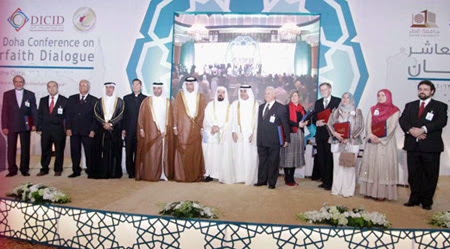By TCN News,
Doha: The 11th Doha Interfaith Dialogue Conference on “Role of Youth in Enhancing the Value of Dialogue” held at Doha, Qatar during 25th-26th March, 2014, where in a session on Religious Perspective on Youth, Dr. Mohammad Manzoor Alam delivered a talk in which he spoke about Dialogue and Role of youth. Dr. Alam is the Chairman of Institute of Objective Studies (IOS), New Delhi.

About Dialogue Dr Alam emphasized the need to know first what dialogue is not, saying “Dialogue is not about establishing a “we versus they” equation and creating a hegemony for our own ideas vis-à-vis their ideas. It is not about creating a hierarchy of ideas.” In his view Dialogue is a healing process, a warm, humane gesture, an open-ended exchange of ideas without forcing anyone to take a certain position or insisting on anyone to take a stand.
Secondly, he spoke of the role that IOS has been playing all these years. IOS organizes international seminars and symposia on interfaith, inter-civilizational dialogue with communities of diverse faiths and ethnicity. Beginning from a major national seminar held on “Fostering Inter-Community Linkages in India” in 2003, the IOS organized another seminar on “Towards Human Understanding Through Dialogue” in New Delhi with an impressive representation of religious leaders of Islam, Christianity, Hinduism, Budhism, Sikhism and Jainism from India and several other countries in 2008. He sees the Indian youth population as an asset to build the nation, saying that India has an edge over China regarding population as India has a young population to harvest the benefits while China has more liability in form of the ageing population. Relating this to peace he said “The Muslim world as a whole has remained peaceful (except for external aggression and civil strife in a few countries) despite the fact that a large proportion of the Muslim world is youthful, with a population of 780 million persons below 25 years of age”.
Dr Alam proposed older generation to share experience and wisdom with the youth. The need for youth to become mature leaders is more urgent in situation where hostile groups deliberately force an ‘Islam versus West’ confrontation through heavily drumming up Islamophobia. Protecting the fair name of Islam is as incumbent on the youth as on the elder generation, says Alam. “Our youth must realise that as the responsibility of practising Islam, it is also their responsibility to establish peaceful relations with other faith groups on the basis of mutual understanding through dialogue and co-operation for common good.”
Finally suggesting the way forward Dr Alam said in colleges and universities, bureaucracies and armed forces across the world religious and sectarian differences are muted and de-emphasised as fellow-feeling is high. In those circles of mainly youthful people the idea of interfaith understanding will readily take root if we work towards it with sincerity and dedication. “We must come to the aid of people hit by natural catastrophe, civil wars, extreme poverty, illiteracy and disease without making any distinction between Muslims and non-Muslims.” He warned that forces of globalisation and history always generate certain negative features like racial and nationalist ideas of supremacy, brutal power play, economic and social inequality, injustice and loss of human dignity.
An important goal of interfaith dialogue is the creation of a humane world for which the youth have to lend support.
